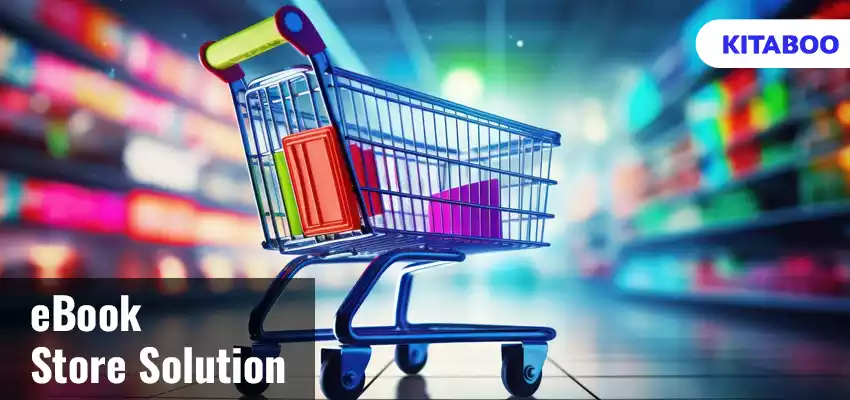
eBook Store Solutions: Your Gateway to Digital Success
Today, digitalization has quite literally taken almost everything offline to the online space, and books are no stranger to this. Physical books were all the rage in the yesteryears, but visiting bookstores has become a rarity now, especially with the emergence of eBooks and digital textbook platforms.
The digital content creator market is slated to experience remarkable growth in the 2020s. A forecast predicts an impressive CAGR of 13.4%, taking revenue from 4216.5 million in 2023 to US$ 14871.6 million by 2033.
As digital content includes textbooks and other eBooks, this growth will boost numerous eBook store solutions through platforms like KITABOO.
Table of Contents
I. Understanding eBook Store Solutions
II. The Benefits of eBook Store Solutions
- Accessibility and Convenience for Readers
- Expanded Reach and Global Distribution
- Cost-Effectiveness for Authors and Publishers
- Analytics and Insights for Data-Driven Decision-Making
III. Key Features to Look for in eBook Store Solutions
- User-friendly Interface and Customization Options
- Secure Payment Gateways and DRM Protection
- Integration with Popular eBook Formats and Devices
- Marketing and Promotional Tools for Selling eBooks Effectively
IV. Comparison of Leading eBook Store Solutions
Understanding eBook Store Solutions
eBook Stores are online platforms that deal in the buying and selling of various digital books. eBook Store Solutions are platforms that allow content creators to distribute and sell their eBooks online. They are a lifeline for authors and readers alike as they allow book enthusiasts to effortlessly explore and find new eBooks across diverse niches.
Explore: Digital Publishing Platform for Associations and Societies
Platforms like Amazon KDP, KITABOO, Apple iBooks, etc., are redefining traditional publishing. These platforms aren’t just digital databases but also act as essential publication channels. Their functionalities are endless, ranging from offering a broad collection of eBooks to connecting authors and readers.
The Benefits of eBook Store Solutions
Further advancements in digitalization has given creators the option to either build their own eBook stores, or sell their eBooks on an existing platform.
Let’s explore some of the benefits of an eBook Store Solution:
Accessibility and Convenience for Readers
Platforms like KITABOO, allow content creators to share their eBooks with their readers anywhere and anytime. This flexibility builds loyal readership.
Expanded Reach and Global Distribution
Experienced and newbie authors alike can now have their work reach a global audience through these solutions. Gone are the days when talented authors struggled to print and distribute books due to challenging processes.
Today, eBook store-fronts act as an author’s gateway, breaking geographical barriers and thus gathering a vast reading audience.
Cost-Effectiveness for Authors and Publishers
With digital publishing, the requirement of printing and physical distribution is eliminated, and thus, it has vastly reduced cost.
This has led to authors and publishers benefitting due to a cost-effective model, maximizing returns on digital investments.
Analytics and Insights for Data-Driven Decision-Making
The modern canon of digital textbook platforms allows authors to gain valuable insights into reader preferences and behaviors. This has further allowed them to refine various analytics tools and data-driven decision-making methods, resulting in better content strategies and optimized digital textbooks.
With detailed analysis, authors and publishers can offer content based on market trends and reader engagement.
In short, the benefits of these store solutions extend beyond just convenience. They offer global reach, cost-effectiveness, and insightful analytics.
Key Features to Look for in eBook Store Solutions
These key features shape a seamless and effective digital publishing experience in the evolving eBook store solutions environment.
User-friendly Interface and Customization Options
Intuitive interfaces and customization of these store-fronts empower eBook creators to enhance their online offerings.
Secure Payment Gateways and DRM Protection
Becoming a trusted eBook store demands a convenient and secure payment process. Trustworthy platforms prioritize secure payment gateways, ensuring seamless transactions for selling eBooks. That said, Digital Rights Management (DRM) protection safeguards an authors’ intellectual property and is thus crucial to have when creating a store-front.
Integration with Popular eBook Formats and Devices
Everything online must consider the impact of integration with diverse formats/devices, whether selling a book or a product. This compatibility can ensure a wider reach and readers’ accessibility simultaneously.
When building a store-front for your eBooks, examine the formats your solution caters to(such as ePub, PDF, MOBI). Besides that, ensure it is compatible with devices like eReaders, tablets, smartphones, and computers. This step will give your readers access to enjoy their eBooks regardless of the format/device they prefer.
Marketing and Promotional Tools for Selling eBooks Effectively
Utilizing marketing and promotional tools can boost visibility in the present competitive eBook market. Authors and publishers must have access to such tools to market their eBooks and strategically reach a broader audience.
Comparison of Leading eBook Store Solutions
Here’s an overview comparing KITABOO and other leading store solutions.
KITABOO
This digital textbook platform, KITABOO, emerges as a leading eBook store solution. KITABOO is a comprehensive eCommerce engine for efficient eBook distribution amongst authors and readers. Its features are endless, from offering a customized website to allowing businesses and institutions to build a brand-aligned eBook store. Although KITABOO might not be ideal for single eBook conversions, it is ideal for diverse publishing and distribution requirements.
Guide:
How to Build an eBook Store
Amazon
Amazon’s Kindle store is one of the largest online eBook repositories. Its user-friendly interface allows readers to navigate through a vast range of titles. The platform utilizes built-in marketing tools and a print-on-demand feature and thus caters to a larger audience. However, authors may have to deal with profit margins as the royalties on book prices vary.
Apple iBooks
Apple iBooks is a self-publishing eBook store. This popular digital platform offers features like detailed sales reports, affiliate programs, and promotional codes. However, readers must have an Apple account to access Apple iBooks, which can be a downside. Besides that, limited reader reach may even affect the reach of eBooks.
Lulu
Lulu is a well-established US-based publishing company. It supports varied services for printed and electronic books, making reading and publishing easier. Lulu offers free ePub conversion, multiple retail options, and advertising services. After passing a quality assurance exam, it offers a hefty royalty for exclusive publishing.
Barnes & Noble Press
Also recognized as B&N Press, the largest US bookshop chain backs this free, fast, easy-to-use self-publishing service. With unique features like pre-orders, organic eBook discovery, and an intuitive sales monitoring dashboard, it captivates readers and authors alike. However, authors may have to deal with ePub format limitations and the need for independent marketing.
Challenges and Solutions in eBook Distribution
Although eBooks have brought about a revolution amongst readers and authors alike, eBook distribution has its challenges. The challenges present themselves as copyright issues and piracy. These are significant hurdles. In this scenario, it is crucial to protect intellectual property rights and thus practice robust measures against unauthorized access.
Besides that, technical challenges such as formatting discrepancies and device compatibility can pop up as obstacles. However, adopting standardized formats and ensuring cross-device compatibility can curb these issues.
Lastly, as the evolving market dynamics and reader preferences add complexity, it is crucial to keep up with trends. Implementing innovative distribution strategies can help authors navigate through different challenges.
Conclusion
In this digital age, eBook store solutions have emerged as an essential platform for authors and publishers alike. Such platforms build bridges between the readers and writers, offering numerous options, unparalleled reach, security, and adaptability.
Adapting to these digital opportunities holds the power to connect global audiences, thereby shaping the future of publishing.
Authors, publishers, and readers can utilize digital textbook platforms like KITABOO and many others for all their reading/publishing needs.
Connect with us now to get started.
Suggested Reads:
Discover how a mobile-first training platform can help your organization.
KITABOO is a cloud-based platform to create, deliver & track mobile-first interactive training content.



